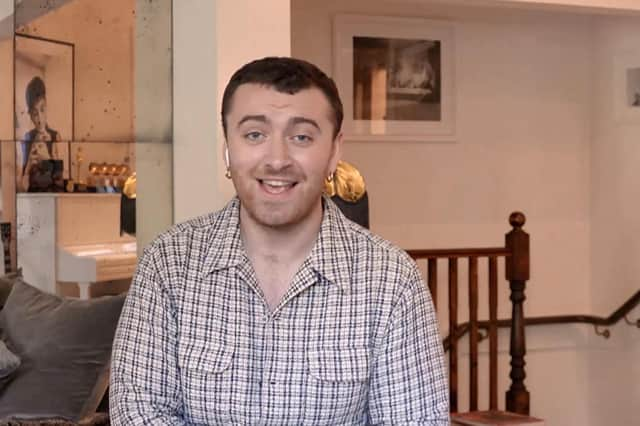Non-Binary Awareness Week: We need to overcome barriers to equality by talking about sensible changes – Vic Valentine


You may not be familiar with the term ‘non-binary’, and that’s ok – whilst it’s become more widely used over the last few years, it’s a term that often people aren’t too sure about.
I’m a non-binary person; a person who doesn’t feel like the terms man or woman describe who I am.
Advertisement
Hide AdAdvertisement
Hide AdWhat the term non-binary means for each individual person who uses it can be quite different. They might think of themselves and their gender as being quite close to either man or woman, but that they aren’t quite right. They might not feel as though they relate to a gender at all. They might feel like their sense of their gender is fluid and changes.
But what all non-binary people have in common is our shared sense that neither “man” nor “woman” feels like a comfortable fit for who we are, and how we want to be seen and understood by others.
I can appreciate that that may seem hard to get your head around. We all grow up in a world that teaches us that everyone will be comfortable thinking of themselves as a man or a woman.
It was hard for me to figure out, and I’m non-binary. I spent a number of years as a teenager trying to put my finger on what it was that made me feel so disconnected, so unable to imagine a happy future for myself.
We all want to be able to live true to who we are, and learning the term non-binary, realising I wasn’t the only person who felt this way, was unbelievably freeing. So was telling my friends and family, and taking steps to feel more like my true self, like changing my name and asking people to use gender neutral pronouns for me.
Using gender neutral pronouns (they/them) is something that often takes some getting used to. Almost everyone is comfortable with others using she/her or he/him when describing them, as expected.
But it’s something we all do all the time without realising it. Say you were on the bus and found a wallet, you might turn to your friend and say “Oh! Someone’s left their wallet. Let’s give it to the bus driver, and hopefully they’ll get it back.”
Many non-binary people ask that you use gender neutral pronouns for us, to show that you respect and accept how we see ourselves. It’s OK if you don’t fully understand it, but simple things like trying to get it right and correcting yourself if you slip up make a big difference, and show us that you care.
Advertisement
Hide AdAdvertisement
Hide AdMany non-binary people (including myself) consider themselves to be trans. LGBT groups and organisations in Scotland and across the world also include non-binary in their work to improve things for trans people.
And we know that a growing chunk of trans people are non-binary – a UK Government LGBT survey in 2017 had more non-binary respondents (over 7,000) than trans men and trans women combined. So even though it may be a term you aren’t too familiar with, it’s becoming more widely used by people to describe who they are.
That’s why I was pleased to be a member of the Working Group for Non-Binary Equality, set up by the Scottish Government to make a series of recommendations for them to consider that would improve non-binary people’s lives. The working group included people working at LGBT equality organisations, academic experts on non-binary equality, and non-binary community members themselves.
It was an important opportunity to start a proper conversation about the barriers non-binary people can face in Scotland to access things we should all be able to rely on, like support from our healthcare services or schools, but more importantly, to make realistic suggestions about how these barriers could be overcome.
The Working Group looked at a wide range of issues that non-binary people face. It would be impossible to do them all justice here, but they included the problems with gender identity services, which have waiting times measured in years and which many non-binary people (and indeed all trans people) feel focus far too much on testing if and why you’re trans and not how you could lead a happier, healthier life.
Also, everyone in Scotland is legally seen as a man or a woman, and almost all ID requires us to have a male or female gender marker; there’s a lack of understanding and support from GPs; and non-binary people who have experienced domestic abuse or sexual violence often lack confidence or struggle to access the right support.
In total, the group made 35 recommendations, which were published this week alongside the Scottish Government’s response. I’m really pleased that they accepted nine, partially accepted 15, and have indicated their willingness to explore eight further. But I’m worried that some of what the government has said is that things they’re doing already will provide the solutions to the problems we highlighted.
In a world that expects everyone to be a man or a woman, not many of the decisions that our public services or government’s take are made with us in mind. And that’s why setting up this group was such a big, important step: there are not many governments around the world who want to understand what’s going on for non-binary people and how they could make things better.
Advertisement
Hide AdAdvertisement
Hide AdBut it’s also why the group made so many recommendations, mostly to do things differently, and to really start to think about how with sensible changes we can better include everyone.
I can’t help but think during this non-binary awareness week, that whilst increased awareness is a massive improvement, we need that awareness to become action.
Vic Valentine is manager of Scottish Trans
Comments
Want to join the conversation? Please or to comment on this article.
